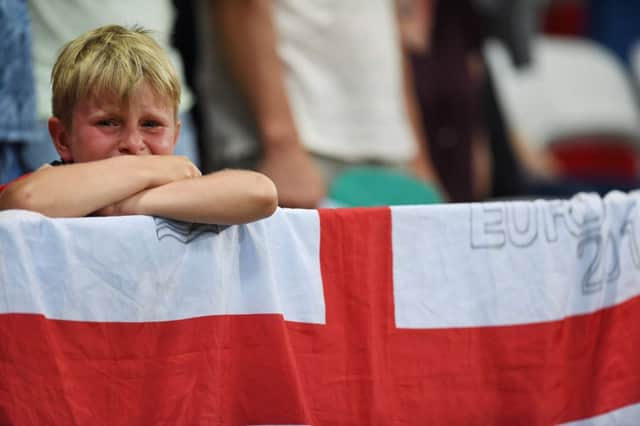Comment: '˜Why England Lose' was proven right again
This article contains affiliate links. We may earn a small commission on items purchased through this article, but that does not affect our editorial judgement.


“My daughter said to me tonight “how can you be disappointed? You literally wrote the book on Why England Lose”,” Szymanski tweeted, including the hashtag ‘Soccernomics’, which is the title of the book internationally.
What the book found was that England don’t actually underachieve, not if you look at the bigger picture. Taking into account the size of the nation and percentage of football supporters in relation to other countries around the world, they found that England win exactly the number of football games they’re expected to. They routinely blow away the competition in qualifying, making it to eight of the last nine tournaments. It just so happens that they struggle to win games once they actually make it, thereby re-establishing their equilibrium.
Advertisement
Hide AdAdvertisement
Hide AdThe trend played out yet again at Euro 2016. England were the only nation to qualify with a 100 per cent record - interestingly, the only other two who came close, Austria and Spain, are also out of the competition - and yet they won only one of their four games. Russia, Slovakia and Iceland are routinely the type of sides England brush aside in qualification and yet failed at the grandest stage.
It’s led to another emotional outburst from ex-pros and supporters. ‘What’s wrong with England?’ they’ve all been crying out. Everyone is looking for answers on the assumption England are not good enough. Had Roy Hodgson’s men been outclassed by Germany or France, having swept aside those in the group with ease, there would have been a clearer distinction between good enough and not good enough; that they were better than the riff-raff but not talented enough to eat at the top table. But it’s difficult to say there is something fundamentally wrong with the talent at the country’s disposal when they’re failing to beat teams they would defeat at least 80 per cent of the time, based on recent history, outwith the pressures of a summer tournament.
It’s a problem that’s lasted decades. Since 1966 they’ve won only six knockout games. In 1986 they defeated Paraguay in the World Cup, four years later it was Cameroon and Belgium. In 1996 they scraped past Spain on penalties. Then they narrowly defeated Denmark and Ecuador in consecutive World Cups, the last of which came in 2006, ten years ago. The most ironic thing about the defeat to Iceland is that it’s the type of victory England never manage. When they’re the underdog, they lose.
Jamie Carragher today pointed the finger of blame at the academy culture, saying players are being mollycoddled and therefore don’t have the experience of dealing with pressure situations. Although, this doesn’t explain why Wales are still in the tournament, when almost the entire Welsh squad came through the same academy system in England.
The difference between the two nations coming into the tournament was the varying degrees of expectation. If Wales exited at the last 16 stage, it would be a triumph. If England went out, it would be a disaster, which is exactly what happened. But you can’t simply say it’s the expectation that’s the problem. Nobody had more expectation at this tournament, nor a messier lead up to the first game than France, and yet the hosts are still in the draw and heavily favoured to at least reach the final four.
Another factor being blamed is the English Premier League and the amount of money in the top flight, but you only have to go back 10 years to the ‘Golden Generation’ to debunk that argument. Back then the Premier League was still the richest in the world, it still had clubs that could buy instead of developing youth, and yet these sides were led by English players in their prime. Also, as we can testify to in Scotland, having a lack of money available to buy players at club level doesn’t necessarily translate to a stronger national team.
Everybody either rushes to blame or searches desperately for answers after an international tournament disappointment, but nothing is definitive. Maybe it’s the culture, maybe it’s the players, maybe it’s the manager. The only thing we know for sure is that England performed exactly as we expected them to. In all likelihood the trend will repeat itself again, starting with a strong qualification campaign for Russia 2018.
DOWNLOAD THE SCOTSMAN APP ON ITUNES OR GOOGLE PLAY